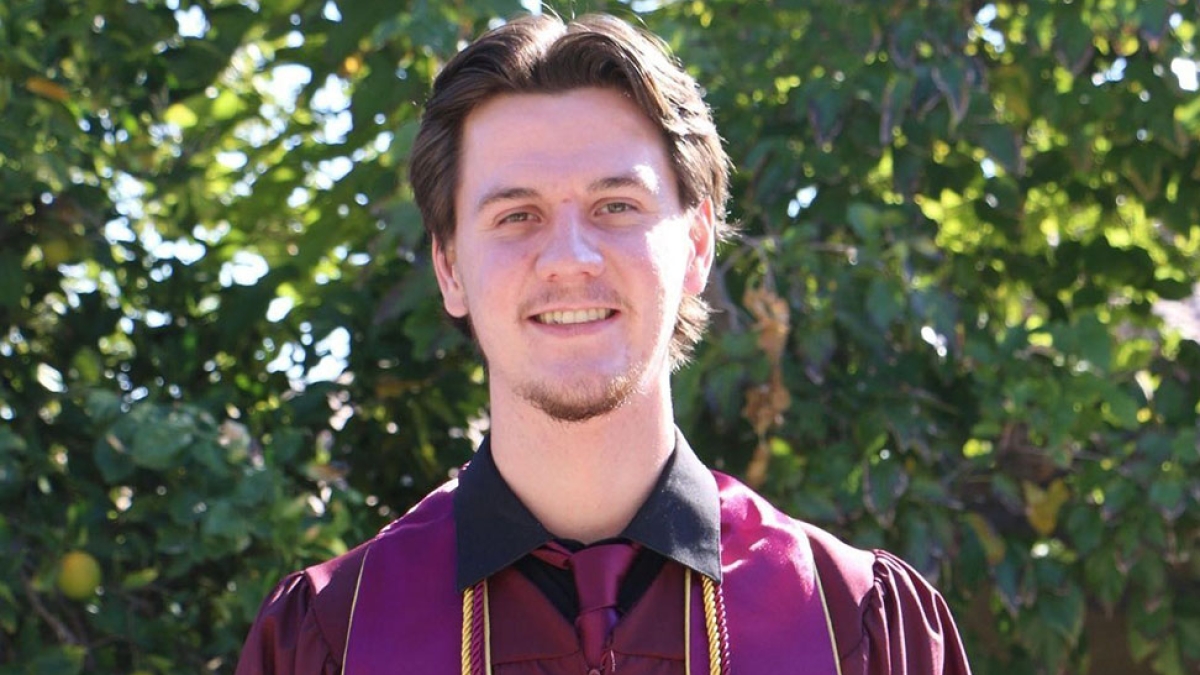A love of basketball put this College of Health Solutions grad on his path

Jacob Patterson
Editor’s note: This story is part of a series of profiles of notable fall 2023 graduates.
Jacob Patterson, who has earned a bachelor's degree in kinesiology from Arizona State University's College of Health Solutions, let a lifelong pursuit help guide his studies.
Patterson found his love for kinesiology through basketball, which he has played most of his life.
“One of the biggest factors in picking kinesiology was my basketball background and the fact that I was an athlete and kind of being active and healthy and everything,” Patterson said.
And now that he's graduating, Patterson plans to continue his kinesiology studies through a clinical doctorate program at Northern Arizona University.
Patterson is also a recipient of the Moeur Award, which is given to undergraduate students with a 4.0 GPA who meet all the criteria. To qualify, graduating students are required to earn all of their courses at ASU within eight consecutive fall and spring semesters with no transfer hours.
So how did he do it?
“I spent the time studying, spent the time making sure that I wasn't missing assignments, going to every class, just kind of being present through it all,” Patterson said.
“I think my attendance was probably near perfect, and even on the classes when it's like, you know you don't have to go, but you can. I feel like I would push myself to be present so that I would retain information."
Here, Patterson elaborates more on his journey and experience studying at ASU.
Notes: Answers may have been edited lightly for length or clarity.
Question: What was your “aha” moment when you realized you wanted to study the field you majored in?
Answer: I wanted to go into a career path that would keep me in a health-like environment and keep me active and everything. Kinesiology fit that perfectly for me with what I wanted to do. I want to learn more about the human body, learn more about how to take care of it, learn more about what it does. My goal is physical therapy, so kinesiology was kind of the stepping stone for me for that.
Q: Why did you choose ASU?
A: There was a time I was going to go play basketball ... and then ... I decided that I was going to give basketball up. I decided that staying in-state would be the best option for me ... and ASU was my favorite out of the three major universities here. And I had a couple brothers that have gone to ASU too, so I just kind of followed their steps.
Q: What’s something you learned while at ASU — in the classroom or otherwise — that surprised you or changed your perspective?
A: I don't judge anyone anymore because I have no idea what's going on in their perspective or what they're looking at or whatever. I don't kind of assume anything. I don't carry stigmas or whatever it might be. I just kind of make sure I keep a blank page with whatever it is until I know as much information about it.
Q: Which professor taught you the most important lesson while at ASU?
A: It would be my special populations' professor, Shannon Ringenbach, who kind of allowed us to explore all of those populations and learn more about them and open up our perspective. And she would even bring in guest speakers from different populations to really show us firsthand what it is like.
Q: What’s the best piece of advice you’d give to those still in school?
A: The best piece of advice I would give them would be to open up and allow connections to be made. Allow yourself to explore and meet different people and learn about new topics and kind of take part in immersing yourself in your classes, and your peers, and your college, and everything. Just kind of take full advantage of what's there.
Q: What was your favorite spot on campus, whether for studying, meeting friends or just thinking about life?
A: I like the fitness complex down there. I spent quite a bit of time in there playing basketball, working out, and just kind of hanging out.
Q: If someone gave you $40 million to solve one problem on our planet, what would you tackle?
A: I would put it through research on health and fitness and active types of experiments to learn more and be better off in that way.
Story by Aidan Hansen, communications assistant, College of Health Solutions
More Health and medicine

Bird flu: Your questions on symptoms, spread and safety answered
Bird flu is no longer only “for the birds.”Infections have expanded beyond wild birds and poultry to a range of animals — from…

Making medicine side-effect free
Many drugs that address medical conditions can come with serious side effects. In drug commercials, the litany of potential side…

Diagnostic research happening at ASU focused on detecting diseases earlier to save lives
It was one of America’s founding fathers, Benjamin Franklin, who may have foreshadowed today’s health care innovation when he…

